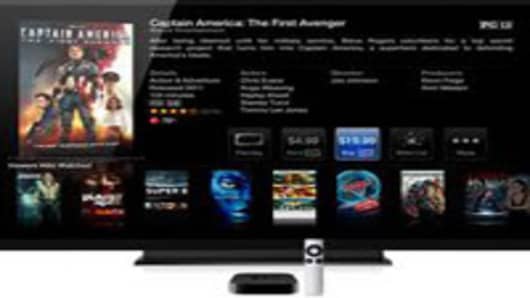It looks like Apple’s mysterious ‘AppleTV’ project may not be so revolutionary — or disruptive — after all.
After months of speculation that Apple will upend the TV business, allowing consumers to ‘cut the cord’ and buy TV channels a la carte, the latest word is that Apple will not threaten cable operators and their media giant partners. (Related Link: Ready for Apple TV?)
The Wall Street Journal reports the tech giant is in talks with cable operators to use its device as a set top box. If this is true, cable and media moguls must be breathing a huge sigh of relief. (Related Link: Apple in Talks With Cable TV Networks - Report.)
The Journal says that talks are about using “an Apple device as a set-top box for live television and other content.” Though nothing has been settled, Apple would offer a service from the cable operators, likely charging them a fee — it takes 30 percent of much of the content it sells. Ultimately Apple would offer a cool interface to seamlessly navigate TV and web content.
(If this is true) Bottom line: Apple is focusing on the box and not the delivery system because the content creation and delivery companies are just far too entrenched to be disrupted. The largest media company — Disney — and the largest distribution company — Comcast — struck a ten year distribution deal earlier this year. That means it’s going to be virtually impossible for Apple to offer channels a la carte. These two giants (and their rivals) are committed to maintaining the status quo — selling huge bundles of channels. Even if Apple offered a huge amount of money for, say, just Disney Channel, or ESPN, they would be unlikely to break the model. Selling individual channels would mean a huge hit to both companies’ bottom lines.
The media giants and distribution companies say it’s not just in their best interest — it’s also in customers best interest — to maintain bundles. By paying for channels they don’t watch customers are subsidizing the smaller channels that not everyone would select. Disney CEO Bob Iger has explained to me, if everyone only paid for the 10 channels they thought they wanted, smaller channels wouldn’t have the financial support survive, and no one would get all the channels they wanted. Both Iger and Time Warner CEO Jeff Bewkes have stressed to me that customers really want the choice of dozens or hundreds of channels and don’t realize just how narrow choices would become without bundles supporting the system.
Yes, an Apple TV could eat into cable carriers business — people could buy more video-on-demand through Apple, and perhaps less VOD from Comcast, DirecTVor Time Warner Cable. But media companies are wary of giving too much control to Apple — look at the disaster that befell the music industry when Steve Jobs controlled all transactions.
So we can expect media companies to drive a hard bargain with Apple, to prevent it from securing a monopoly on video on demand, and to protect their lucrative relationship with cable carriers.
-By CNBC's Julia Boorstin
@JBoorstin
Questions? Comments? MediaMoney@cnbc.com
Disclosure:
Comcast is the majority owner of NBC Universal, the parent company of CNBC and CNBC.com.



